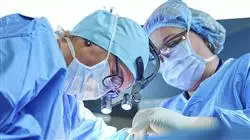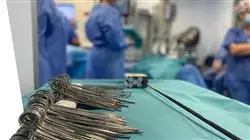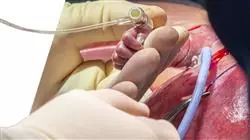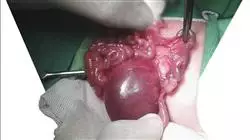University certificate
The world's largest faculty of medicine”
Description
It delves into the management of the surgical patient, trauma, fetal and neonatal surgery, pediatric urology, plastic surgery and pediatric oncology”

The field of Pediatric Surgery currently faces various challenges that require constant updating by medical professionals.
and specialists. With a multidisciplinary approach, surgical pediatricians work closely with other health care professionals. In recent years, the specialty has faced technological advances, changes in clinical practices and therapeutic approaches, as well as new ethical and management challenges. Therefore, it is essential that Pediatric Surgery specialists stay up to date on the latest trends and advances in this area to provide the best possible care to their pediatric patients.
In order to assist this situation, TECH has created the advanced master’s degree in Pediatric Surgery, a highly specialized program that offers complete and updated teaching in this area of medicine. This program is justified based on the context in which the specialty is located, as technological advances and scientific research continue to evolve rapidly, requiring medical professionals and specialists to stay updated to provide optimal care to their patients.
advanced master’s degree in Pediatric Surgery is a continuing education option that allows medical professionals and specialists to update themselves on the latest advances and techniques in Pediatric Surgery. This program offers a comprehensive and updated approach in areas such as general Pediatric Surgery, neonatal surgery, oncologic surgery or urological surgery, among others. In addition, the program also addresses relevant topics such as pre- and postoperative management, clinical decision making, and management of complications.
One of the notable advantages of the advanced master’s degree in Pediatric Surgery is that it is a 100% online program, which provides flexibility to medical professionals and specialists to adapt their learning to their schedules and professional responsibilities. This allows participants to access program content from anywhere and at any time, which is especially beneficial for those who want to update but have time or geographic limitations. Additionally, the online format of the program allows access to a wide range of digital resources, including lectures, videos, clinical cases and study materials, which enriches the learning experience.
Analyze the latest developments in endoscopy, laparoscopy, thoracoscopy, robotic surgery and more surgical techniques in the advanced master’s degree in Pediatric Surgery at TECH”
This advanced master’s degree in Pediatric Surgery contains the most complete and up-to-date scientific program on the market. The most important features include:
- The development of practical cases presented by experts in Pediatric Surgery
- Graphic, schematic, and practical contents which provide scientific and practical information on the disciplines that are essential for professional practice
- Practical exercises where the process of self-assessment can be used to improve learning
- Special emphasis Dental is placed on innovative methodologies in the approach in Pediatric Patient
- Theoretical lessons, questions to the expert, debate forums on controversial topics, and individual reflection assignments
- Content that is accessible from any fixed or portable device with an Internet connection
Update yourself on the latest techniques and advances in Pediatric Surgery, especially in pediatric oncological surgery, tumors, skeletal dysplasias, syndromic diseases and more”
It includes in its teaching staff professionals belonging to the field of pediatrics, who pour their work experience into this program, as well as recognized specialists from leading societies and prestigious universities.
The multimedia content, developed with the latest educational technology, will provide the professional with situated and contextual learning, i.e., a simulated environment that will provide an immersive learning experience designed to prepare for real-life situations.
This program is designed around Problem-Based Learning, whereby the student must try to solve the different professional practice situations that arise throughout the program. For this purpose, the professional will be assisted by an innovative interactive video system created by renowned and experienced experts.
Get up to date on children's orthopedics, upper limb, hip, spine, foot pathology and more, providing a comprehensive approach to the management of orthopedic disorders in children and adolescents"

Delve into the most up-to-date knowledge of Pediatric Surgery"
Objectives
The objectives of the Grand Master in advanced master’s degree in Pediatric Surgery are designed to offer medical professionals and specialists comprehensive and updated teaching in the various areas of Pediatric Surgery, addressing topics such as general and digestive surgery, fetal and neonatal surgery, pediatric urology, surgical head and neck or children's orthopedics, among others.

The advanced master’s degree in Pediatric Surgery gives you the opportunity to acquire updated skills and knowledge in a specialty that is constantly evolving”
General Objectives
- Develop specialized knowledge and current treatments in Pediatric Surgery
- Compile the different diagnostic methods, as well as the different therapeutic options, both medical and surgical, depending on the pathology
- Expose the possible associated complications and the prognosis of these diseases
- Establish current treatment guidelines for each of the pathologies described
- Complement the training of specialists in Pediatric Surgery with special interest in minimally invasive techniques: pediatric laparoscopy and endoscopy
- Adequately prepare these professionals to face with guarantee and quality the different pediatric pathologies that can be addressed through these access routes
- Enable students to offer professional assistance supported by an accredited teaching program
- Knowing how to carry out a good assessment of the child, starting with the anamnesis, a tool that is often underused but essential, a structured and complete examination that, depending on the age, will have different perspectives
- Become familiar with the management of the different congenital and/or acquired alterations affecting the upper limb of growing patients
- Delve into the complementary studies that help diagnose and make decisions, as well as the appropriate moment to perform them
- Manage therapeutic options, as well as the treatment schedule
- Apply different surgical techniques used to treat various pathologies
- Become familiar with the pathology, clinical presentation and management of the most common benign and malignant tumors of the upper extremity affecting children
- Recognize and manage the major diseases of the hip that affect children
- Manage the examination and diagnosis of hip pathology in children according to their age and the prevalence associated with it
- To review the most important pathologies that occur in pediatric orthopedics, as knowledge of them is the fundamental pillar of this speciality
- To learn about the latest advances in the treatment of these classic pediatric orthopedics diseases
- Become familiar with the diagnosis, treatment and prognosis of orthopedic and traumatological knee pathologies in children and their particular characteristics compared to adults
Specific Objectives
Module 1. Pediatric Surgery Surgical Patient Management Trauma. Robotics in Pediatric Surgery
- Generate knowledge in health care bioethics
- Analyze the most recent advances in laparoscopic surgery and robotic surgery
- Determine the pre- and postoperative nutritional management of the surgical patient
- Acquire the necessary knowledge to establish the different modes of special nutrition, enteral, parenteral and other feeding routes
- Substantiate the concept of Bioethics. Establishment of a limitation of therapeutic effort and palliative care
- Examine the latest updates in laparoscopic surgery and share initial experiences in the introduction of robotic surgery applied to Pediatric Surgery, as well as in the fields it applies
Module 2. Laparoscopy General and Digestive I
- Examine new techniques and tests available for diagnosing disorders motility and functional
- Delve into esophageal functional tests, especially the less common ones such as impedancemetry and esophageal manometry
- Analyze the treatments with the best results in esophageal replacement
- Determine the most frequent pathologies with diagnostic techniques and current therapies
Module 3. Pediatric surgery General and Digestive II
- Determine the main digestive and liver pathologies that can occur in pediatrics, including inflammatory bowel disease, short bowel syndrome and intestinal transplantation, coloproctology as well as hepatobiliary diseases and liver transplantation
- Acquire specialized knowledge about IBD and development of the different therapeutic options that can be applied
- Determine the different causes that can cause intestinal failure. Driving of short bowel syndrome in all its stages
- Establish the management of patients with anorectal malformations or disease by Hirschsprung
- Analyze the functional tests used in coloproctology, with special emphasis on anorectal manometry and its different indications
- Examine the most common hepatobiliopancreatic pathology
Module 4. Pediatric Fetal and Neonatal Surgery
- Develop the concept of fetal medicine and point out the necessary participation of the pediatric surgeon in the diagnosis and treatment of malformation pathology during the fetal period
- Analyze normal embryological development and know its alterations that condition the main neonatal congenital malformations
- Examine surgical pathologies acquired in the neonatal period and know their differential diagnosis
- Analyze the evolutionary and prognostic advice of the main perinatal congenital pathologies for the parents of the affected fetus
- Propose a guide to material and human resources for surgical procedures in neonatal intensive care units
- Examine the main international consensus guidelines on the perinatal management and follow-up of pathologies treated in the neonatal period, mainly esophageal atresia, congenital diaphragmatic hernia and anorectal malformation
- Substantiate the current clinical, analytical and radiological criteria for the evaluation of infectious intestinal processes acquired in the neonatal period
- Establish current protocols for the management and treatment of the syndrome short intestine as a sequel to neonatal surgical pathologies
Module 5. Head and Neck Surgery
- Analyze normal embryological development and its alterations that condition congenital malformations of the face, neck and their structures
- Examine the most common congenital pathologies, their anatomy and their pathological implications
- Present, systematically, the treatment of cleft lip and palate and malformation syndromes of the fusion of facial structures
- Analyze the tumor pathologies that occur at the facial and tumor level
- Determine the treatment of infectious pathologies in the region
- Establish guidelines for action in the event of secondary malformations to alterations in the development of the branchial arches
- Specify treatments for pathologies of the glands in the region oral and cervical
- Systematize the approach to pathologies of the cervical lymph nodes
- Put in order airway alterations and their treatment
- Train the pediatric surgeon to diagnose and treat pathologies of the cervico-facial region
Module 6. Pediatric Surgery Airway and Chest
- Determine the most frequent congenital and acquired pathologies and know your differential diagnosis
- Establish the current therapeutic possibilities in the management of chest wall malformations
- Establish current guidelines in the management of airway pathology in the pediatric patient
- Acquire skill in the management of congenital bronchopulmonary malformations
- Address appropriate therapeutic management in acquired pleuropulmonary pathology
- Examine the appropriate management of thoracic malformations within the wide range of surgical and conservative techniques available in the present
- Assess the advances, experience, results and prognosis of the different treatments available in airway pathology
- Develop adequate management in the prenatal and postnatal treatment of bronchopulmonary malformations with adequate prenatal counseling
- Determine the thoracoscopic approach and the specific surgical techniques used for every child pathologies
- Generate skills in the use of endoscopy, bronchoscopy and laryngoscopy techniques, which provide essential information for the diagnosis and treatment of respiratory diseases in childhood
Module 7. Pediatric Urology I. Upper urinary tract. Pathology and Surgical Techniques
- Determine the management of pathologies in pediatric urology (theoretical-practical) through the approach to diagnosis, treatment and monitoring of the patient, in the prenatal and postnatal periods
- Analyze the knowledge and management of the different surgical techniques (endoscopic, laparoscopic and percutaneous) for the care of patients with childhood urological pathology
- Determine the most frequent congenital pathologies in the kidney
- Differentiate obstructive pathology from reflux pathology
- Generate knowledge in kidney surgery
- Review percutaneous, pneumovesicoscopic, and retroperitoneoscopic renal surgery
- Evaluate the different access methods of percutaneous approach in the pediatric patient
- Develop the different types of lithotripsy used in kidney stones
Module 8. Urology Pediatrics II. Urinary Tract Infections Lower
- Analyze the management of congenital and acquired lower urinary tract pathologies in pediatric urology (theoretical-practical), through the approach in the diagnosis, treatment and monitoring of the patient both in the prenatal and postnatal periods
- Develop the pediatric neuropathic bladder
- Differentiate diagnostic and therapeutic techniques used to resolve congenital and acquired pathologies
- Examine the current situation of pediatric neuropathic bladder
- Analyze the pathophysiology of the pathology
- Determine the management of bladder exstrophy and epispadias
- Present the child's genital pathology
Module 9. Pediatric Plastic Surgery
- Develop congenital soft tissue pathology, its embryonic development and its implications in children and adolescents, and acquired soft tissue pathology, its epidemiology and its implications in children and adolescents Substantiate and classify vascular anomalies by updating protocols of treatment
- Determine the comprehensive management of the pediatric burn patient, peculiarities depending on age and type of burn
- Classify anomalies of the auricle and their therapeutic options
- Assess the different ways of undertaking the closure of wounds and defects on the skin and soft tissues
- Learn to diagnose and lay the foundations for the treatment of rare acquired injuries in children and adolescents
Module 10. Pediatric Oncology Surgery
- Generate specialized knowledge about the most common solid neoplasms in pediatrics
- Determine the appropriate diagnostic approach to different pediatric neoplasms
- Establish appropriate treatment strategies for each of these tumors
- Evaluate the main causes of surgical emergencies in pediatric oncology and to clarify the surgical indications in these cases
- Fundamentals of basic principles in Pediatric Oncology
- Analyze the tumor pathologies that occur in the pediatric age
- Update staging and treatment protocols
- Systematize the surgical approach to tumor pathologies in the pediatric age
- Generate specialized knowledge on the main biopsy techniques in pediatric oncologic patients
- Familiarize the pediatric surgeon for the diagnosis and surgical treatment of the main pediatric tumors
- Provide an update on fertility preservation techniques in the pediatric oncology patient
Module 11. Genitourinary Endoscopy
- Handle urological endoscopic instruments, to through cystoscopy and ureterorenoscopy, in order diagnose and treat many urological pathologies
- Many pathologies affecting the renoureteral system are managed endoscopically, so it is essential to know how to perform these procedures correctly
- Know the genitourinary malformations that require endoscopic exploration and treatment
Module 12. Endoscopy Via Digestive Tract
- Describe digestive endoscopy as a diagnostic and therapeutic method in treating pediatric digestive tract pathology
- Provide knowledge of the therapeutic techniques used in esophagogastroscopy and colonoscopy
Module 13. Airway Endoscopy
- Know the instrumentation necessary to perform rigid and flexible bronchoscopy in the pediatric patient
- Study the pathology susceptible to treatment by this route and the endoscopic techniques that are applied for its treatment
Module 14. Laparoscopy thoracoscopy and cervicothoracic surgery
- Describe the thoracic pathologies currently treated by thoracoscopy
- Know the thoracoscopic approach and the specific surgical techniques used for every child pathologies
- Understand the specific anesthetic conditions that the patients require while undergoing these treatments
Module 15. Laparoscopy General and Digestive I
- Be able to handle with ease and obtain knowledge about all the pathology included in general surgery that can be treated by laparoscopy
Module 16. Laparoscopy Surgery General and Digestive II
- Delve into the different laparoscopic surgical techniques that can be applied to different pathologies according to different authors Application
Module 17. Oncologic Laparoscopy: Gonadal Laparoscopy
- Know transperitoneal and retroperitoneal laparoscopy in depth, and know which route is appropriate for the approach of urological pathologies, taking into account that one or the other is usually used depending on the patient, personal experience or the tendency of each service
- Study pediatric urological pathologies and the laparoscopic techniques used to treat them
- Learn about pneumovesicoscopy as an alternative for the treatment of some specific urological pathologies
Module 18. Urology
- Study the different gynecological pathologies in pediatrics and the laparoscopic surgical techniques to solve them
Module 19. Neonatal and fetal surgery
- Learn the peculiarities of laparoscopic neonatal surgery, such as the size of the laparoscopic instruments, certain pathologies exclusive to this age group and the surgical techniques used in neonatal pathology
- Know those neonatal malformations that are attempted to be corrected prenatally and to know which ones require prenatal management and how to approach them
Module 20. Abdominal Surgery through Single Port
- Have an in-depth knowledge of laparoscopic surgery, to know which techniques can be performed with it and what are its advantages and limitations This surgery is the maximum expression of laparoscopic minimally invasive surgery and
- allows different procedures to be performed through it
Module 21. Child Orthopedics
- Take a detailed medical history and a complete, orderly and systematic examination of pediatric patients
- Distinguish physiological from pathological development, as well as their radiological characteristics
- Learn the complementary tests and radiological characteristics of bone growth
- Learn the intricacies of the etiopathogenesis of deformities in the lower limb axis
- Anticipate and correct potential deformities
- Differentiate and know how to treat musculoskeletal pathologies associated with normal child development
- Apply the basics of fracture treatment in pediatric patients
Module 22. Upper Limb
- Delve into the knowledge of the origin and embryology of the different
- congenital malformations
- Become familiar with the different congenital malformations, studying etiopathogenesis, clinical studies, complementary studies, classifications and treatments of each pathology
Module 23. Hip
- Manage the diagnosis, examination and treatment of hip dysplasia, taking into account the different ages of children
- Delve into hip exploration, which is essential in neonatal screening
- Understand Perthes’ disease with clear management ideas, differentiating between outdated treatments and new perspectives on the disease
- Make an early diagnosis of adolescent hip pathology, which is crucial for the survival of the hip in adulthood, and learning how to manage it properly, including complex hip reduction surgeries including complex reduction surgeries to reduce the size and shape of it
- Learn to recognize coxa vara and spring hip and assess their clinical implications for receiving proper treatment
Module 24. knee
- Learn to distinguish the clinical-radiological characteristics of patients with discoid meniscus
- Differentiate the types of discoid meniscus
- Perform a differential diagnosis of popliteal cysts
- Recognize the clinical, radiological and epidemiological features of Osgood-Schlatter disease
- Identify possible warning signs of Osgood-Schlatter disease
- Perform an adequate diagnosis of patellofemoral instabilities
- Learn the osteochondral lesions of children
- Delve into the implications of cruciate ligament rupture in children
- Manage fractures around the knee
- Differentiate between stable and unstable fractures for correct treatment
Module 25. Pathology of the Foot
- Gain in-depth knowledge of the etiopathogenesis of foot malformations and deformities
- Diagnose through anamnesis and physical examination
- Apply the complementary tests required for diagnosis, and primarily be able to assess and describe the radiographic images in the different pathologies
- Interpret when different diagnostic tests are appropriate
- Gain in-depth knowledge on treating each pathology. Lean the common techniques of manipulation and casting in the pediatric age, as well as the different surgical techniques required to treat each pathology
- Learn the natural history and evolution of each process
Module 26. Spine
- Learn the characteristics of the different pathologies around the spine in pediatric patients
- Learn the most frequent causes of spine deformity
- Manage the urgency of pediatric patients with spinal pathology, torticollis, atlantoaxial instability
- Conduct a long-term management of patients diagnosed with spinal deformity in infancy
- Conduct a long-term management of patients diagnosed with tumors / fractures during infancy
- Suspect and learn the management of tumors such as osteoid osteoma, aneurysmal bone cyst, etc
- Perform the necessary tests to diagnose the different entities
Module 27. Spine
- Learn available knowledge on the prevention and management of hip dislocation
- Learn the management algorithms for each pathological gait pattern
- Make decisions using three-dimensional motion analysis
- Delve into surgical techniques by anatomical segments
- Learn the application of orthoses and rehabilitation after multilevel surgery
Module 28. Skeletal Dysplasias and Syndromic Diseases
- Specialize in the etiology and pathogenic theories of bone dysplasias and congenital malformations of the lower limbs
- Perform an accurate assessment of the different diagnostic tests
- Delve into the natural history and evolution expectancy of each process
- Gain in-depth knowledge of the different treatment methods and the best moment to carry them out, depending on the pathology
Module 29. Osteoarticular Infections
- Learn the microbiologic characteristics of the different infectious musculoskeletal pathologies in pediatric patients
- Delve into the most prevalent germs that cause infectious pathology
- Develop a correct strategy for the differential diagnosis of diseases that cause lameness in pediatric patients
- Learn the emergency management of pediatric patients with infectious musculoskeletal pathologies
- Gain in-depth knowledge on the hospital management of patients admitted for musculoskeletal infections
- Apply the long-term management of patients diagnosed with musculoskeletal infections during infancy
- Manage and identify other non-infectious arthropathies, as well as their management in pediatric patients
- Suspect and learn how to manage recurrent multifocal osteomyelitis
Module 30. Tumours
- Appropriately guide the diagnostic study of this lesion and, if a musculoskeletal biopsy is necessary, learn how to perform it
- Learn the latest up-to-date treatments for the main musculoskeletal
- injuries in children

A program that will give you access to the latest scientific postulates in the field"
Advanced Master's Degree in Pediatric Surgery
At TECH Global University, we understand the importance of specialized training in the field of surgical pediatrics, which requires highly trained and updated professionals. Therefore, we have developed our Advanced Master's Degree in Surgical Pediatrics, designed for those specialists who seek to acquire the knowledge and skills necessary to provide quality care to pediatric patients. This virtual Postgraduate Certificate in offers comprehensive training in the diagnosis and treatment of pediatric surgical pathologies, including laparoscopic procedures, minimally invasive surgical techniques and perioperative management in the pediatric setting.
The Grand Master in Surgical Pediatrics program is designed for those specialists seeking to acquire the knowledge and skills necessary to provide quality care to pediatric patients.
The Advanced Master's Degree program in Surgical Pediatrics at TECH Global University has a practical and up-to-date approach, addressing topics such as neonatal surgery, pediatric oncologic surgery, gastrointestinal, urologic and orthopedic surgery, among others. Participants will have the opportunity to interact with experts in the field, access cutting-edge educational resources and develop clinical and surgical skills through clinical cases and virtual practices. We employ the latest digital content and academic methodologies to enhance learning. This, coupled with flexibility and autonomy in the classroom, is a unique advantage for those interested in enhancing their professional profile. Get the cutting-edge degree you need to excel in the field of pediatric surgery with our Postgraduate Professional Master's Degree at TECH Global University.







